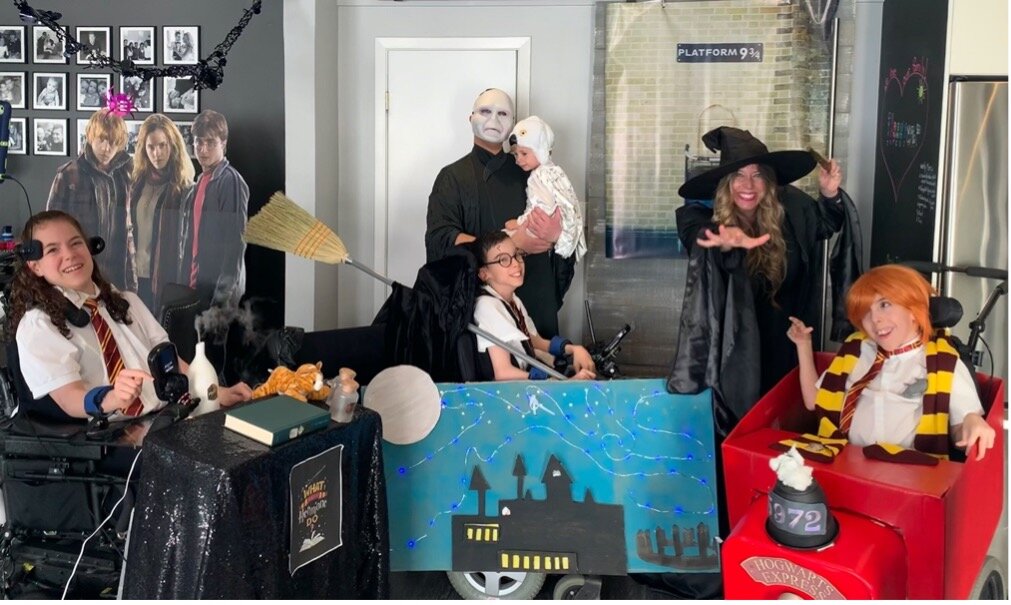As a patient-oriented research network, CHILD-BRIGHT’s success hinges on active partnerships and meaningful collaborations between our members, from patients and their families to researchers, health professionals, and decision-makers in health care. Across the network, around 70 patient-partners regularly collaborate on research projects, sit on committees, and actively contribute to the research on childhood brain-based developmental disabilities happening across Canada.
This series is a result of conversations that took place in 2020 with five of our patient-partners. By sharing their experiences and motivations, we hope to stimulate ever-growing connections across our projects, programs, and committees, and better understand the variety of experiences that these individuals bring to bear on their partnerships with us. Next up is our conversation with Dana Geall.
Dana Geall is a woman who wears many hats. “First and foremost, I am a mom,” she says proudly. She is a parent to triplets Brody, Taylor and Cole, who all have cerebral palsy (CP), and Jagger, now 2.5 years old.
Before the birth of the triplets, she was a teacher. After their birth, Dana switched gears and in 2010 founded Three to Be, a registered charity in support of children with neurological disorders and their families. Over the next seven years, with Dana at the helm as executive director for several of those years, Three to Be would raise over $5 million to support research into neurological disorders.
One of the research projects funded by the charity would eventually, in 2016, become CHILD-BRIGHT’s Enhancing Brain Repair with Metformin (Metformin in CP) project. At that time, Three to Be also joined CHILD-BRIGHT as a gold-level funding partner. The Metformin in CP project team is evaluating whether a drug called metformin, combined with physiotherapy, enhances motor and thinking skills in children with CP.
She joined the project as a parent-partner and now contributes her expertise as a member of the project’s Stakeholder Engagement Committee (SEC), consisting of five stakeholders with a wide range of lived experience in the CP community.
Dana with Brody, Cole, and Taylor (from left to right) on a grassy field.
This all means that Dana has been able to observe the progression of the study from its very beginnings to today: “It's been a beautiful kind of relationship, watching it go from an idea to a pilot trial to an actual clinical trial that's hopefully going to help kids,” she shares. (The project has since begun enrolling participants for its clinical trial.)
While that’s been an exciting experience, wearing these different hats has not come without its own set of personal challenges: while all three of the triplets were screened for eligibility for the study, none was ultimately deemed eligible. “As a parent who has been a part of the process since the laboratory research phase, this was extremely devastating.”
“You have your parent hat that prioritizes your own kids and wants to make sure that they are going to be a part of this trial,” she explains. “At the same time, because I am a part of the stakeholder engagement committee and because I have always cared about all kids who could benefit from such treatments, you want to make sure that [the trial] is safe for these kids and that they meet the criteria [for the study].”
Despite that bittersweet note, Dana has gleaned much insight into the research process over the years, from her time as executive director of Three to Be, then as a patient-partner. She’s realized just how much is involved in conducting such a research study, she says, and how long it can take to see results that can help affected populations: “For the families, the most difficult part of it all is waiting and waiting and waiting, because all you want to do is help your kids, as well as other kids like your kids.”
Pictured: (From left to right) Taylor, Cole, and Brody, with Dana’s husband Jason holding Jagger and Dana standing behind them, celebrate a very Harry Potter Halloween.
She is also convinced of the importance of patient-partnership in research. “I think it's so important for the parents and the patient's voice to be heard by the people who are running the study. I think it's a beautiful partnership,” she shared.
“The beautiful thing about CHILD-BRIGHT is that they actually really prioritize this partnership, and they thought it was really, really important to make sure that the people they hope to help are being heard.”
Being a part of the network has also meant tapping into a strong community of parents who have taught her about research and about parenting: “Everyone brings their own unique expertise to it all, and I always learn from other parents!”
“We are kind of like our own little village that supports one another and gets it,” she continues. “There really is a huge community of people that are facing similar challenges and if you lean on one another, it makes the process and the journey so much better and so much easier.”
Thank you to Dana Geall for taking the time to share her perspective with us!




